Seagate 7200.10 500GB: Hitting the Sweet Spot
by Gary Key and Dave Robinet on July 6, 2007 11:00 PM EST- Posted in
- Storage
iPEAK Video/Audio Tests
The iPEAK based Video/Audio benchmarks are designed around simulating media encoding and HTPC activities. These are basic benchmarks at this time but this section will be expanded in the future. These benchmarks are CPU intensive in nature but also require a balanced storage system with the ability to handle read and write requests simultaneously in a very efficient manner. Using iPEAK also effectively removes the CPU from the equation, allowing us to focus on the hard drives.
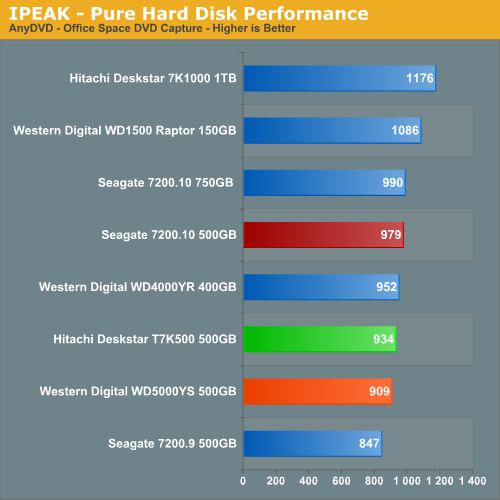
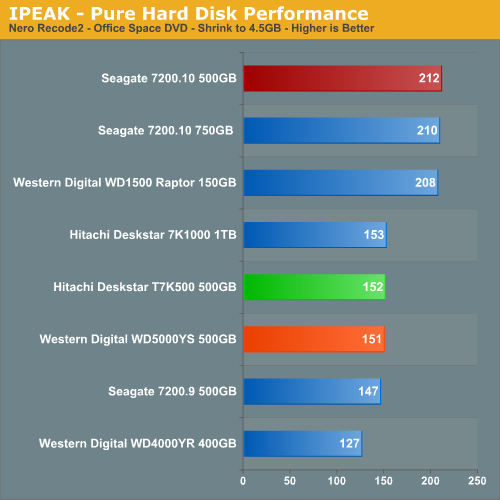
The AnyDVD benchmark is heavily weighted to sequential write requests which favor the Seagate drive over the other 500GB offerings. We noticed the Seagate 7200.10 drives pausing a couple of times during streamed writes due to the smaller cache size after witnessing buffer overruns in the trace file when compared to the Hitachi 1TB drive.
The Nero Recode 2 benchmark is weighted to streaming read requests but is balanced by continuous write operations near the end of the test. This benchmark is one of the most demanding ones in our test suite with the disk being active the entire trace file with several 100% utilization peaks. The Seagate 7200.10 500GB results are excellent as the drive is able to process large data blocks in sequential order very efficiently.
iPEAK Game Installation Tests
Our iPEAK based Game Installation benchmarks simply show the ability of the hard drive to write data as quickly as possible to the disc based upon the installation software instructions. As detailed in our iPEAK setup description we installed the games from our source drive in order to eliminate the optical drive bottleneck. In separate application timing we witnessed basically the same percentage spread when installing the games via our DVD drive so these results are representative of actual installation performance.
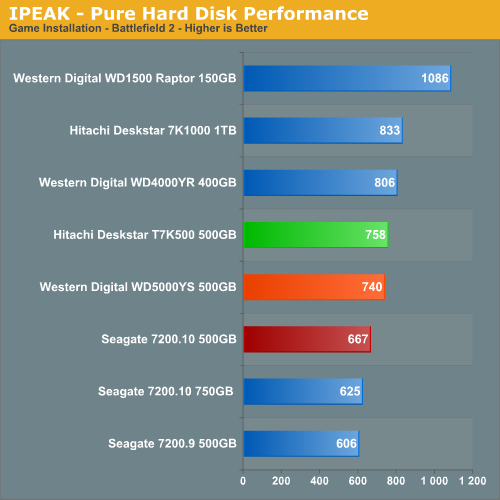
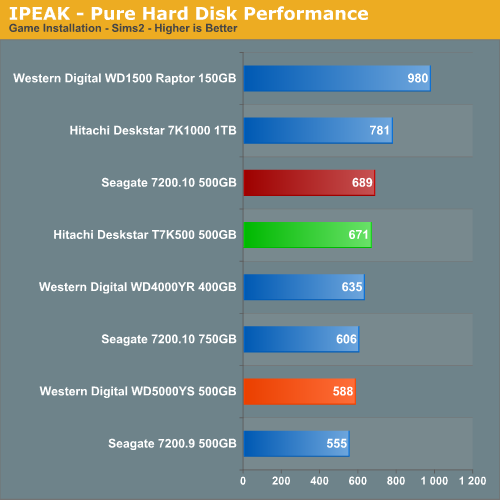
The Raptors once again finish at or near the top in our gaming tests due to their rotational and random access speed advantages. From a pure performance viewpoint the Seagate 7200.10 finishes 13% behind the Hitachi 500GB drive in Battlefield 2 and is 2% quicker in Sims2.
iPEAK Game Play Tests
The iPEAK based Game Play tests are centered on the benefits of having a hard disk that can load non-linear or sequential data files quickly without interrupting the flow of the game.
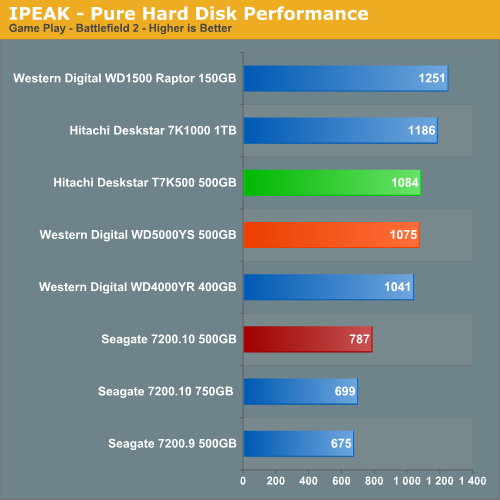
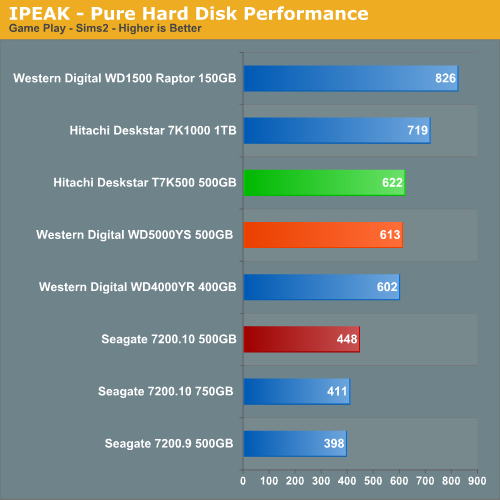
When it comes to gaming the Raptors rule. Although we are looking at pure performance results, in subjective testing the Hitachi 1TB 7200rpm drive "felt" as fast as the Raptor family of drives when loading or playing a game. To be quite honest, it was difficult to tell any differences between the other 7200rpm drives although the Seagate 7200.10 500GB drive finished about 37% behind the Hitachi 500GB offering.
We need to remember our IPeak tests reflect pure hard drive performance and will be mitigated by the system platform components as we will see in our application tests.
The iPEAK based Video/Audio benchmarks are designed around simulating media encoding and HTPC activities. These are basic benchmarks at this time but this section will be expanded in the future. These benchmarks are CPU intensive in nature but also require a balanced storage system with the ability to handle read and write requests simultaneously in a very efficient manner. Using iPEAK also effectively removes the CPU from the equation, allowing us to focus on the hard drives.


The AnyDVD benchmark is heavily weighted to sequential write requests which favor the Seagate drive over the other 500GB offerings. We noticed the Seagate 7200.10 drives pausing a couple of times during streamed writes due to the smaller cache size after witnessing buffer overruns in the trace file when compared to the Hitachi 1TB drive.
The Nero Recode 2 benchmark is weighted to streaming read requests but is balanced by continuous write operations near the end of the test. This benchmark is one of the most demanding ones in our test suite with the disk being active the entire trace file with several 100% utilization peaks. The Seagate 7200.10 500GB results are excellent as the drive is able to process large data blocks in sequential order very efficiently.
iPEAK Game Installation Tests
Our iPEAK based Game Installation benchmarks simply show the ability of the hard drive to write data as quickly as possible to the disc based upon the installation software instructions. As detailed in our iPEAK setup description we installed the games from our source drive in order to eliminate the optical drive bottleneck. In separate application timing we witnessed basically the same percentage spread when installing the games via our DVD drive so these results are representative of actual installation performance.


The Raptors once again finish at or near the top in our gaming tests due to their rotational and random access speed advantages. From a pure performance viewpoint the Seagate 7200.10 finishes 13% behind the Hitachi 500GB drive in Battlefield 2 and is 2% quicker in Sims2.
iPEAK Game Play Tests
The iPEAK based Game Play tests are centered on the benefits of having a hard disk that can load non-linear or sequential data files quickly without interrupting the flow of the game.


When it comes to gaming the Raptors rule. Although we are looking at pure performance results, in subjective testing the Hitachi 1TB 7200rpm drive "felt" as fast as the Raptor family of drives when loading or playing a game. To be quite honest, it was difficult to tell any differences between the other 7200rpm drives although the Seagate 7200.10 500GB drive finished about 37% behind the Hitachi 500GB offering.
We need to remember our IPeak tests reflect pure hard drive performance and will be mitigated by the system platform components as we will see in our application tests.










19 Comments
View All Comments
VooDooAddict - Sunday, July 8, 2007 - link
Transfer performance differences of most drives seems negligible for single drive end users. Actual formated size, heat, warranty, noise, and the ever important price are the keys for end users.That isn't to say your performance numbers are useful. I'd almost bet that engineers from SAN manufactures like EqualLogic check out these reviews. When you have those performance differences amplified by running 14+ spindles it's a little more noticeable.
Kaleid - Sunday, July 8, 2007 - link
with platter density at record high 334GB.PenGun - Sunday, July 8, 2007 - link
You know some of us need to know how fast a drive writes. Any reason that information is not available? All these stupid unzip the file are just braindead.lopri - Saturday, July 7, 2007 - link
What is the theoretical advantage of 'perpendicular' design? Out of curiosity.TA152H - Sunday, July 8, 2007 - link
Better density.psychobriggsy - Saturday, July 7, 2007 - link
5 year warranty.'nuff said.
Although a 3 year warranty isn't so bad, but that last 10% of performance really doesn't excite me when it's regarding hard drives.
Yeah, yeah, I'm justifying my 320GB 7200.10 :p
JakeBlade - Saturday, July 7, 2007 - link
Sorry, that should be 1 out of 10. (Drank too much wine with my steak tonight).LoneWolf15 - Sunday, July 8, 2007 - link
Got any stats to back that up? If so, I'd love to see them. 10% within 10 months seems like an awfully high failure rate to me (unless you're talking about long-defunct brands like JTS and Kalok).JakeBlade - Saturday, July 7, 2007 - link
5 year, 10 year, 15 year warranty. When the drive is made dirt cheap from the disenfranchised workforce in China, any hard drive company can easily slap a warranty on anything that needs 1 out of every 25 replaced within 10 months, while still making a huge profit from cheap manufacturing costs. My source: Newegg -- 266 reviews, first ~25 from lowest rating report DOA/Failure.Golgatha - Monday, July 9, 2007 - link
sarcasmYes, I can't imagine that those who received a DOA hard drive or one that failed within a short period of time being a little miffed and taking their frustration out on the Newegg.com ratings boards.
/sarcasm